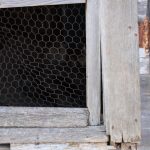Chickens can be a nuisance when they invade your property. They can cause damage to gardens, lawns, and flower beds by scratching and pecking at the soil. Additionally, they can leave droppings all over the place, creating an unsightly and unsanitary environment. Chickens are also known to be attracted to food sources such as compost piles, pet food, and bird feeders, which can lead to further problems. Furthermore, their constant clucking and crowing can be disruptive and annoying, especially in the early hours of the morning. It is important to understand the reasons why chickens may be unwanted visitors in order to effectively address the issue and prevent future occurrences.
In some cases, chickens may be escaping from nearby properties and wandering into your yard in search of food or shelter. They may also be attracted to the presence of other animals or the availability of food sources. Understanding these factors can help in devising strategies to deter chickens from entering your property and causing damage.
Table of Contents
- 1 Creating Physical Barriers: Fencing and Netting
- 2 Using Natural Deterrents: Plants and Scents
- 3 Implementing Sound and Visual Deterrents: Scarecrows and Noise Makers
- 4 Securing Food Sources: Properly Storing and Disposing of Food
- 5 Seeking Community Support: Communicating with Local Chicken Owners
- 6 Seeking Professional Help: Contacting Animal Control or Local Authorities
Creating Physical Barriers: Fencing and Netting
One effective way to prevent chickens from entering your property is by creating physical barriers such as fencing and netting. Fencing can be used to enclose gardens, flower beds, and other areas that are vulnerable to chicken damage. It is important to use sturdy materials such as wire mesh or chicken wire to ensure that the fencing is strong enough to withstand the scratching and pecking of chickens. Additionally, the fencing should be buried at least a few inches into the ground to prevent chickens from digging underneath it.
Netting can also be used to protect plants and crops from chicken damage. It can be draped over fruit trees, vegetable patches, and other areas to prevent chickens from accessing them. When using netting, it is important to ensure that it is securely fastened and does not have any gaps or openings that chickens can slip through. By creating physical barriers, you can effectively deter chickens from entering your property and causing damage.
Using Natural Deterrents: Plants and Scents
In addition to physical barriers, natural deterrents such as plants and scents can also be used to discourage chickens from entering your property. Certain plants are known to repel chickens due to their strong odors or unpalatable taste. For example, marigolds, lavender, and rosemary are all plants that chickens tend to avoid. By strategically planting these types of plants around vulnerable areas, you can create a natural barrier that deters chickens from causing damage.
In addition to plants, certain scents can also be used to repel chickens. For example, citrus peels, garlic, and vinegar are all known to be effective at keeping chickens away. These scents can be used in the form of sprays or sachets that are placed around the perimeter of your property or in areas that are vulnerable to chicken damage. By using natural deterrents, you can create an environment that is unappealing to chickens and prevent them from entering your property.
Implementing Sound and Visual Deterrents: Scarecrows and Noise Makers
Sound and visual deterrents can also be effective at deterring chickens from entering your property. Scarecrows are a classic method of keeping birds away from crops and gardens. By placing scarecrows in vulnerable areas, you can create a visual deterrent that makes chickens think twice about entering your property. It is important to regularly move and change the appearance of scarecrows to prevent chickens from becoming accustomed to them.
In addition to scarecrows, noise makers can also be used to deter chickens. For example, wind chimes, bells, or even a radio playing at low volume can create a constant background noise that makes chickens uncomfortable and less likely to enter your property. By implementing sound and visual deterrents, you can create an environment that is unappealing to chickens and prevent them from causing damage.
Securing Food Sources: Properly Storing and Disposing of Food
Chickens are often attracted to food sources such as compost piles, pet food, and bird feeders. To prevent chickens from entering your property in search of food, it is important to properly store and dispose of food. Compost piles should be covered with a secure lid or enclosed in a bin to prevent chickens from accessing them. Pet food should be stored in sealed containers that are not easily accessible to chickens. Bird feeders should be placed in areas that are not easily accessible to chickens or equipped with baffles that prevent them from reaching the seeds.
In addition to securing food sources, it is important to properly dispose of food waste. Leftover scraps should be disposed of in a secure compost bin or disposed of in a way that does not attract chickens. By securing food sources and properly disposing of food waste, you can prevent chickens from being attracted to your property.
Seeking Community Support: Communicating with Local Chicken Owners
If you are experiencing issues with unwanted chickens on your property, it may be helpful to seek support from the local community, especially if the chickens belong to nearby properties. Communicating with local chicken owners can help in addressing the issue and finding a mutually beneficial solution. By discussing the problem with chicken owners, you can work together to identify the root cause of the issue and implement strategies to prevent future occurrences.
In some cases, local ordinances or regulations may exist that address the keeping of chickens and their impact on neighboring properties. By communicating with local authorities or homeowner associations, you can gain support in addressing the issue and finding a resolution that benefits all parties involved. Seeking community support is an important step in addressing issues with unwanted chickens on your property.
If efforts to deter unwanted chickens from entering your property have been unsuccessful, it may be necessary to seek professional help by contacting animal control or local authorities. Animal control agencies have the expertise and resources to address issues related to unwanted animals on private properties. By contacting animal control, you can receive assistance in addressing the issue and finding a solution that is in compliance with local regulations.
In some cases, local authorities may have ordinances or regulations in place that address the keeping of chickens and their impact on neighboring properties. By contacting local authorities, you can gain support in addressing the issue and finding a resolution that benefits all parties involved. Seeking professional help is an important step in addressing issues with unwanted chickens on your property.
In conclusion, unwanted chickens can be a nuisance when they invade your property. By understanding the reasons why chickens may be unwanted visitors and implementing strategies such as physical barriers, natural deterrents, sound and visual deterrents, securing food sources, seeking community support, and seeking professional help, you can effectively address the issue and prevent future occurrences. It is important to take proactive measures to deter unwanted chickens from entering your property and causing damage. By doing so, you can create an environment that is unappealing to chickens and maintain a peaceful and harmonious living space for both humans and animals alike.
Meet Walter, the feathered-friend fanatic of Florida! Nestled in the sunshine state, Walter struts through life with his feathered companions, clucking his way to happiness. With a coop that’s fancier than a five-star hotel, he’s the Don Juan of the chicken world. When he’s not teaching his hens to do the cha-cha, you’ll find him in a heated debate with his prized rooster, Sir Clucks-a-Lot. Walter’s poultry passion is no yolk; he’s the sunny-side-up guy you never knew you needed in your flock of friends!







